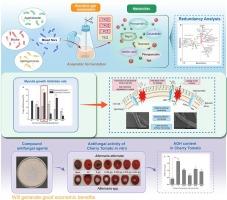Gracilaria 琼脂废水厌氧发酵后对植物病原真菌的抗真菌机制和应用。
IF 9.7
1区 环境科学与生态学
Q1 AGRICULTURAL ENGINEERING
引用次数: 0
摘要
琼脂生产过程中会产生大量废水,既威胁生态环境,又浪费生物质资源。废水中生物质资源的高值化利用是废水处理的关键因素之一。我们研究了废水中大分子多糖通过厌氧发酵转化为具有抗真菌活性的小分子物质的过程和抗真菌机理。结果表明,厌氧发酵 GAW 对交替缠绕菌和交替缠绕菌的抑制率分别为 91.06% 和 88.94%。16S rDNA 测序和代谢组学研究发现,优势菌种如 Blautia、Agathobacter 和 Sphingomonas 将多糖转化为酚酸类物质,如原花青素 C 和花青素。这些物质破坏了真菌细胞的完整性,导致其死亡。利用发酵产物制备复合抗真菌剂可有效抑制樱桃番茄的腐败和毒素产生。这项研究为海藻废弃资源的再利用提供了可靠的技术支持。本文章由计算机程序翻译,如有差异,请以英文原文为准。

Antifungal mechanism and application to phytopathogenic fungi after anaerobic fermentation of Gracilaria agar wastewater
Agar production is accompanied by a large amount of wastewater, which threatens the ecological environment and wastes biomass resources. The high-value utilization of biomass resources in wastewater is one of the key factors in wastewater treatment. We investigated the conversion process and antifungal mechanism of large molecule polysaccharides in wastewater into small molecule substances with antifungal activity through anaerobic fermentation. The results indicated that anaerobic fermentation of GAW achieved inhibition rates of 91.06 % and 88.94 % against Alternaria alternata and Alternaria spp. 16S rDNA sequencing and metabolomics revealed that dominant species such as Blautia, Agathobacter and Sphingomonas converted polysaccharide into phenolic acids like procyanidin C and columbidin. These substances disrupted the integrity of fungal cells, leading to their death. The preparation of composite antifungal agents using fermentation products effectively inhibited cherry tomato spoilage and toxin production. This study provided reliable technical support for the reuse of seaweed waste resources.
求助全文
通过发布文献求助,成功后即可免费获取论文全文。
去求助
来源期刊

Bioresource Technology
工程技术-能源与燃料
CiteScore
20.80
自引率
19.30%
发文量
2013
审稿时长
12 days
期刊介绍:
Bioresource Technology publishes original articles, review articles, case studies, and short communications covering the fundamentals, applications, and management of bioresource technology. The journal seeks to advance and disseminate knowledge across various areas related to biomass, biological waste treatment, bioenergy, biotransformations, bioresource systems analysis, and associated conversion or production technologies.
Topics include:
• Biofuels: liquid and gaseous biofuels production, modeling and economics
• Bioprocesses and bioproducts: biocatalysis and fermentations
• Biomass and feedstocks utilization: bioconversion of agro-industrial residues
• Environmental protection: biological waste treatment
• Thermochemical conversion of biomass: combustion, pyrolysis, gasification, catalysis.
 求助内容:
求助内容: 应助结果提醒方式:
应助结果提醒方式:


